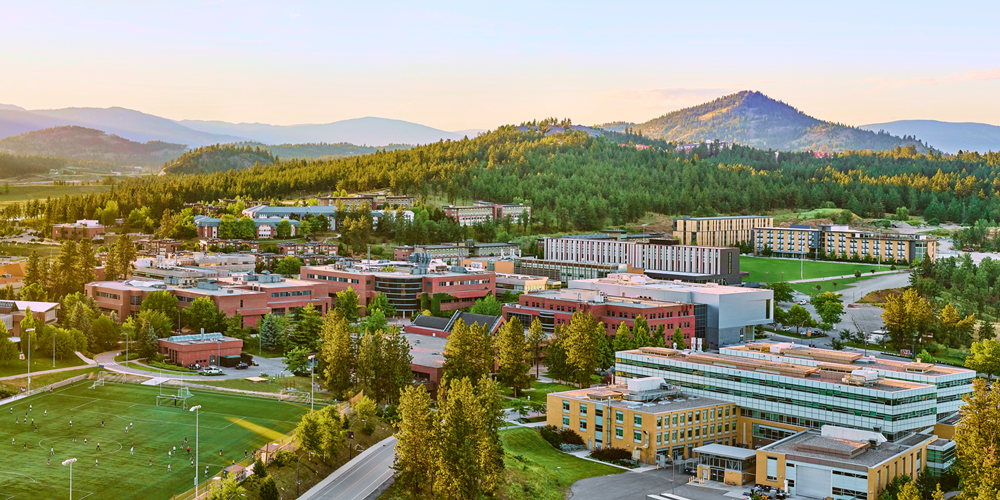Degrees & Programs
Inquire
Pamela Flagel
Undergraduate Academic Programs Assistant
250.807.9808
education.ubco@ubc.ca
Pamela Flagel
Undergraduate Academic Programs Assistant
250.807.9808
education.ubco@ubc.ca

Degree
Bachelor (60 credits)
Length
11* months
Faculty/School
Okanagan School of Education
Immerse yourself in innovative teaching and learning within our generalist teacher education program. Our 11-month* post-degree program is designed to equip you with the skills to inspire diverse learners in diverse contexts, and emphasizes student-centered approaches. Gain extensive practical experience through in-situ learning opportunities and two school-based practicums, including a 13-week internship that prepares you for the dynamic realities of today’s classrooms.
You will be engaged in competencies of creative and critical thinking, community, and personal and social responsibilities aligning with the BC Kindergarten – Grade 12 curriculum. Additionally, many other place-based learning opportunities that are reflective of this territory and the histories and aspirations of Indigenous Peoples of this land are infused throughout the program.
*Pending final approval by the British Columbia Teachers’ Council in early February 2026.
To inspire and be inspired is at the heart of UBC Okanagan’s Bachelor of Education (BEd) program. Throughout this generalist BEd program, you will experience a variety of approaches to teaching and learning, and work alongside educators on campus, in schools and in the community. We offer two pathways: Teaching Children (Kindergarten to Grade 5) and Teaching Adolescents (Grade 6 to 9+). Students may choose French as their language of instruction in either pathway.
Our courses and field experiences take place over a 11-month* span starting mid-August. You can review the schedule of courses on BEd Student Resources page.
Build a broad foundation and great career potential with the UBCO BEd program. Graduates can teach at elementary, middle and secondary levels, or consider pursuing a career in a variety of fields like,
You could soon be studying at one of the world’s top universities. Be sure to review the content below to prepare for attending UBC Okanagan.
To be eligible for admission to the Bachelor of Education program, students must have:
|
|
The self-assessment guide contains examples of Canadian Studies, Lab Sciences and Mathematics UBCO courses that can meet the requirements.
All required coursework must be completed by April 30, prior to commencement in the program.
Information posted is from UBC’s Academic Calendar. In the event of a discrepancy, the Academic Calendar shall be held to be correct.
Students wishing to have coursework considered in a discipline not listed, or if they’re unsure whether their course credits meet the criteria (or are transferable from another University) should consult with an Academic Advisor.
For more information on applying to the program, including the Supplemental Application Form and two Reference Reports that will need to be submitted with your application, visit Applying to Bachelor of Education.
This self-assessment form can assist you in reviewing academic admission requirements for your admission pathway.
Applicants should review the BEd self-assessment guide prior to starting the form to ensure it’s filled out correctly.
English is the language of instruction at UBC. If you completed your degree at a university in a country where English is not the only official language, you may need to provide results of an English language proficiency test as part of your application. There are numerous ways to meet the English Language Admission Standard.
To be eligible for admission to the Bachelor of Education program, students must have:
A 3-credit lab science is typically scheduled for three hours of lecture and two or three hours of labs per week. Courses in Computer Science are not acceptable lab science courses
|
|
1If the teachable subject is French, students must also successfully complete an oral and written French language competency assessment to the level specified for French as a second language. Please see the admission requirements details on teaching in French.
2If the teachable subject is General Science, the 24 credits of academic coursework can be a combination of Biology, Chemistry, and/or Physics courses. Other science courses may be included in the 24 credits upon approval.
3If the teachable subject is Music, Theatre, or Visual Art at least 6 of the required 24 credits must be studies in theory (i.e., non-studio).
4If the teachable subject is Social Studies (Anthropology, Economics, Geography, History, Political Science, or Sociology) the 24 required credits must include the following:
Coursework relating to the disciplines above in the areas of Canadian Studies, Cultural Studies, Asian Studies, Gender and Women’s Studies, Indigenous Studies, Religious Studies (of a non-doctrinal nature), Classical Studies, Urban Studies, or Environmental Sciences may be considered provided an examination of the course syllabi reveals such a relationship.
The self-assessment guide contains examples of Canadian Studies, Lab Sciences and Mathematics UBCO courses that can meet the requirements.
All required coursework must be completed by April 30, prior to commencement in the program.
Information posted is from UBC’s Academic Calendar. In the event of a discrepancy, the Academic Calendar shall be held to be correct.
Students wishing to have coursework considered in a discipline not listed, or if they’re unsure whether their course credits meet the criteria (or are transferable from another University) should consult with an Academic Advisor.
For more information on applying to the program, including the Supplemental Application Form and two Reference Reports that will need to be submitted with your application, visit Applying to Bachelor of Education.
This self-assessment form can assist you in reviewing academic admission requirements for your admission pathway.
Applicants should review the BEd self-assessment guide prior to starting the form to ensure it’s filled out correctly.
English is the language of instruction at UBC. If you completed your degree at a university in a country where English is not the only official language, you may need to provide results of an English language proficiency test as part of your application. There are numerous ways to meet the English Language Admission Standard.
Students who complete the Indigenous Teacher Education Program (NITEP) Elementary & Middle Years Option offered through the Faculty of Education at UBC’s Vancouver campus through the UBC Okanagan field centre can be admitted to the Teaching Children pathway of the Okanagan School of Education’s Bachelor of Education.
To be eligible for admission, applicants must have completed 90 credits of core academic and Indigenous concentration courses as outlined below.
| Academic Component* | |
| English 100-level Literature and Composition | 6 |
| Canadian Studies | 3 |
| Science | 3 |
| Mathematics | 3 |
| Senior Academic Courses | 18 |
| Approved Electives | 36 |
| Indigenous Concentration | |
| EDUC 140 | 3 |
| EDUC 141 | 3 |
| EDUC 143 | 2 |
| EDUC 240 | 3 |
| EDUC 244 | 2 |
| EDUC 344 | 2 |
| EDCP 362d | 3 |
| LLED 336 | 3 |
| Total Credits | 90 |
*Students should consult with NITEP regarding course planning. All courses must be university level.
The Bachelor of Education (B.Ed.) French Pathways prepares teachers to teach from kindergarten to grade 9+ in:
To apply for the French pathways, you’ll need to meet the admission criteria for either the Teaching Children or Teaching Adolescents Pathway (please see the criteria above).
In addition, you’ll need to submit one of the following as proof of French competency*:
*You can upload your proof of French competency in your supplemental application or email it to parcours.francais@ubc.ca.
As one way to show French language competency, prospective applicants to the Bachelor of Education (BEd) program who wish to teach French-as-a-Second-Language (FSL) either in Core French or French Immersion are encouraged to complete the Diplôme d’études en langue française (DELF B2) and/or Diplôme approfondi de langue française (DALF C1) prior to applying to the program. Ideally, this competency test should be taken in the third or fourth year of undergraduate studies.
DELF/DALF results are normally submitted as part of the application to the BEd program. If the DELF/DALF is taken after applying, please email your test results to parcours.francais@ubc.ca.
Please note: There are limited seats and dates available.
Potential candidates to the French Pathways may be contacted by the Education Office in regards to their French proficiency during the application review process.
When the application process is open and you are ready to apply for the French pathway, you will select either Teaching Children or Teaching Adolescents in your online application. You will indicate in the Supplemental Application Form that you are interested in the French pathway.
Questions related to the French Pathways may be directed to parcours.francais@ubc.ca.
In addition to tuition and student fees, Bachelor of Education students have program fees that cover general program expenses including field trips and workshops.
Register to receive emails about information sessions, application open dates, deadline reminders and program updates.
Already applied? Check your status or accept your offer.
Join us for an information session to learn more about UBCO’s 11-month* Bachelor of Education (BEd) program. This session is designed to provide you with insights into the admissions requirements, application process, program highlights and more! The session will be comprised of a brief presentation and an opportunity to ask questions.
Thursday, December 18, 2025
3:30 p.m. to 4:30 p.m.
Online via Zoom
*Pending final approval by the British Columbia Teachers’ Council in early February 2026


A diverse natural region with sandy beaches, beautiful farms, vineyards, orchards and snow-capped mountains, the Okanagan is an inspirational landscape perfect for those seeking leisure or outdoor adventure.
UBC’s Okanagan campus borders the dynamic city of Kelowna, a hub of economic development with a population of more than 150,000 people— the fourth fastest-growing population in Canada.
Already applied? Check your status or accept your offer.